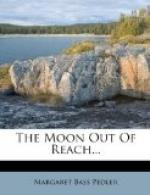“It sounds a trifle boring. Like a visitor who never knows when it’s time to go.”
Rooke smiled.
“You’re trying to switch me off the main theme, which is your work.”
She sprang up.
“Don’t bully me any more,” she said quickly, “and I’ll play you one of my recent compositions.”
She sauntered across to the piano and began to play a little ripping melody, full of sunshine and laughter, and though a sob ran through it, it was smothered by the overlying gaiety. Rooke crossed to her side and quietly lifted her hands from the keys.
“Charming,” he said. “But it doesn’t ring true. That was meant for a sad song. As it stands, it’s merely flippant—insincere. And insincerity is the knell of art.”
Nan skimmed the surface defiantly.
“What a disagreeable criticism! You might have given me some encouragement instead of crushing my poor little attempt at composition like that!”
Rooke looked at her gravely. With him, sincerity in art was a fetish; in life, a superfluity. But for the moment he was genuinely moved. The poseur’s mask which he habitually wore slipped aside and the real man peeped out.
“Yours ought to be more than attempts,” he said quietly. “It’s in you to do something really big. And you must do it. If not, you’ll go to pieces. You don’t understand yourself.”
“And do you profess to?”
“A little.” He smiled down at her. “The gods have given you the golden gift—the creative faculty. And there’s a price to pay if you don’t use the gift.”
Nan’s “blue violet” eyes held a startled look.
“You’ve got something which isn’t given to everyone. To precious few, in fact! And if you don’t use it, it will poison everything. We artists may not rust. If we do, the soul corrodes.”
The sincerity of his tone was unmistakable. Art was the only altar at which Rooke worshipped, it was probably the only altar at which he ever would worship consistently. Nan suddenly yielded to the driving force at the back of his speech.
“Listen to this, then,” she said. “It’s a setting to some words I came across the other day.”
She handed him a slip of paper on which the words were written and his eyes ran swiftly down the verses of the brief lyric:
Empty hands
Away in the sky, high over our heads,
With the width of a world
between,
The far Moon sails like a shining ship
Which the Dreamer’s
eyes have seen.
And empty hands are out-stretched in vain,
While aching eyes beseech,
And hearts may break that cry for the
Moon,
The silver Moon out of reach!
But sometimes God on His great white Throne
Looks down from the Heaven
above,
And lays in the hands that are empty
The tremulous Star of Love.
Nan played softly, humming the melody in the wistful little pipe of a voice which was all that Mature had endowed her with. But it had an appealing quality—the heart-touching quality of the mezzo-soprano—while through the music ran the same unsatisfied cry as in her setting of the old Tentmaker’s passionate words—a terrible demand for those things that life sometimes withholds.




